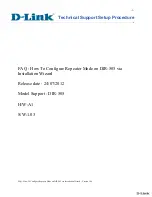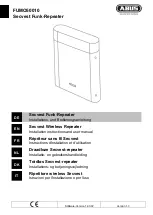
Compact Unit / Utility Heater
5
Operating Instructions and Owner’s Manual
SHIPPING
The heater is completely assembled. Installation instructions, two
mounting brackets (shipped loose), and a flue transition are included.
Check the unit for shipping damage. The receiving party should
contact the last carrier immediately if any shipping damage is found.
REQUIREMENTS – CSA IN THE USA
Installation of gas unit heaters must conform with local building codes
or, in the absence of local codes, with the current National Fuel Gas
Code ANSI Z223.1.
Installation in aircraft hangers must be in accordance with the current
Standard for Aircraft Hangers ANSI/NFPA No. 409.
Installation in parking structures must be in accordance with the
current Standard for Parking Structures ANSI/NFPA No. 88A.
Installation in repair garages must be in accordance with the current
Standard for Repair Garages ANSI/NFPA No. 88B.
These units are approved for residential applications. For installation in
a residential garage these units must be installed so that the bottom
of the heater is located no less than 8 feet (2.438m) above floor.
Heater must be located or protected to avoid physical damage by
vehicles. Refer to the National Fuel Gas Code, ANSI Z223.1, current
edition.
Authorities having jurisdiction should be consulted before NFPA
installation. Air for combustion and ventilation must conform to the
methods outlined in ANSI Z223.1, section 5.3, Air for Combustion
and Ventilation, or applicable provisions of local building codes. The
National Fuel Gas Code is available from:
American National Standard Institute Inc.
11 West 42nd Street
New York, NY 10036
These units are CSA International design certified. These unit heaters
are certified for installation to combustible material as listed in
table
1
and on unit rating plate. Accessibility and service clearances must be
observed in addition to fire protection clearances.
All electrical wiring and ground for unit must be in accordance with
the regulations of the current National Electric Code ANSI/No. 70.
The National Electric Code is available from:
National Fire Protection Association
1 Batterymarch Park
PO Box 9101
Quincy, MA 02269-9101
TABLE 1
UNIT CLEARANCES
Top
Sides
Access Panel
in
mm
in
mm
in
mm
1
25
1
25
18
457
Bottom
Rear
in
mm
in
mm
0
0
18
456
REQUIREMENTS – CSA IN CANADA
The instructions are intended only as a general guide and do not
supersede local codes in any way. Authorities having jurisdiction
should be consulted before installation. The installation must conform
with local building codes or in the absence of local codes, with the
current CSA B149.1, Natural Gas and Propane Installation Code. All
electrical wiring and grounding for the unit must also comply with the
Canadian Electrical Code CSA C22.1, current edition.
These heaters are CSA International certified for the clearances to
combustible material listed on the rating plate and
table1
. Provide
adequate clearance around air openings into the combustion
chamber, clearances from combustible material, and provisions for
accessibility and for combustion and ventilation air supply. Provision
shall be made for service accessibility to the heater. Note that fire
protection clearances may be exceeded to provide additional space for
service and accessibility.
GARAGE INSTALLATIONS
Installation in parking structures must be in accordance with the
current Standard for Parking Structures ANSI/NFPA No. 88A.
Installation in repair garages must be in accordance with the current
Standard for Repair Garages ANSI/NFPA No. 88B.
1. In a storage area, clearance from heaters to combustible materials
must be such that the material shall not attain a temperature above
160°F by continuous operation of the unit.
2. Eight foot minimum clearance from the floor to the bottom of the
heater must be maintained. Refer to the CSA B149.1, Natural Gas
and Propane Installation Code.
AIRCRAFT HANGER INSTALLATIONS
Installation of gas unit heaters must conform with local building codes
or, in the absence of local codes, with the current National Fuel Gas
Code ANSI Z223.1.
1.
In an area where aircraft are housed or serviced, 10’ minimum
clearance from highest surface of aircraft to bottom of the heater
must be maintained.
2.
In other areas, 8’ minimum clearance from the floor to bottom of
heater must be maintained.
3. Heaters should be located so as to be protected from damage from
aircraft or other appliances needed for servicing of aircraft. Refer to
requirements of the enforcing authorities.






































